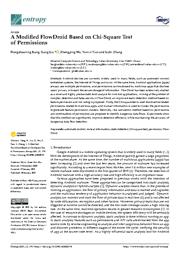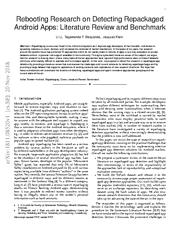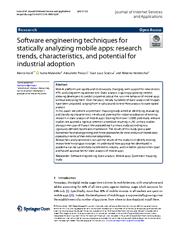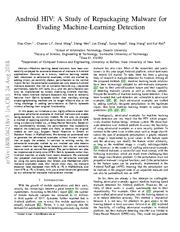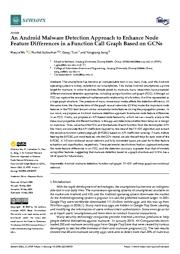A copy of this work was available on the public web and has been preserved in the Wayback Machine. The capture dates from 2021; you can also visit the original URL.
The file type is application/pdf.
Filters
A Modified FlowDroid Based on Chi-Square Test of Permissions
2021
Entropy
FlowDroid has been extensively studied as a novel and highly precise static taint analysis for Android applications. ...
At the same time, Android applications (apps) always use multiple permissions, and permissions can be abused by malicious apps that disclose users' privacy or breach the secure storage of information. ...
DAPASA [18] is an approach used to detect Android piggybacked apps through sensitive subgraph analysis. ...
doi:10.3390/e23020174
pmid:33573210
fatcat:ojsvpsneebh6rnaklyro2c4ziq
Rebooting Research on Detecting Repackaged Android Apps: Literature Review and Benchmark
[article]
2018
arXiv
pre-print
In this work, we propose to reboot the research in repackaged app detection by providing a literature review that summarises the challenges and current solutions for detecting repackaged apps and by providing ...
Repackaging is a serious threat to the Android ecosystem as it deprives app developers of their benefits, contributes to spreading malware on users' devices, and increases the workload of market maintainers ...
[21] Supervised Learning coefficient/distance of sensitive subgraph/motifs DR-Droid2 [20] Supervised Learning user interactions, sensitive APIs, permissions DR-Droid [28] Supervised Learning user ...
arXiv:1811.08520v1
fatcat:zjpauswnn5fprdqdnetp3zbhfu
Software engineering techniques for statically analyzing mobile apps: research trends, characteristics, and potential for industrial adoption
2021
Journal of Internet Services and Applications
of mobile apps. ...
Static analysis is gaining a growing interest, allowing developers to predict properties about the run-time behavior of mobile apps without executing them. ...
We established the need for performing a review on static analysis of mobile app (Section 3), we identified the main research questions (Section 4.1), and we defined the protocol to be followed by the ...
doi:10.1186/s13174-021-00134-x
fatcat:mlzjbkdi7fhezisn3tcv7wzlbi
Android HIV: A Study of Repackaging Malware for Evading Machine-Learning Detection
[article]
2018
arXiv
pre-print
Machine learning based solutions have been successfully employed for automatic detection of malware in Android applications. ...
In this paper, we introduce a new highly-effective attack that generates adversarial examples of Android malware and evades being detected by the current models. ...
[15] proposed DAPASA, an approach to detect Android piggybacked applications through sensitive subgraph analysis. Xu et al. ...
arXiv:1808.04218v3
fatcat:iwy54k7zgbf6zb5im6ocv7hdpa
An Android Malware Detection Approach to Enhance Node Feature Differences in a Function Call Graph Based on GCNs
2023
Next, we calculate the API coefficient inspired by the idea of the TF-IDF algorithm and extract the sensitive function called subgraph (S-FCSG) based on API coefficient ranking. ...
In our work, we propose an Android malware detection approach to enhance node feature differences in an FCG. ...
[16] proposed an approach to detect Android piggybacked apps called DAPASA. ...
doi:10.3390/s23104729
pmid:37430643
pmcid:PMC10224091
fatcat:ofm2b7dgffgavo3jlyc26f3bny

